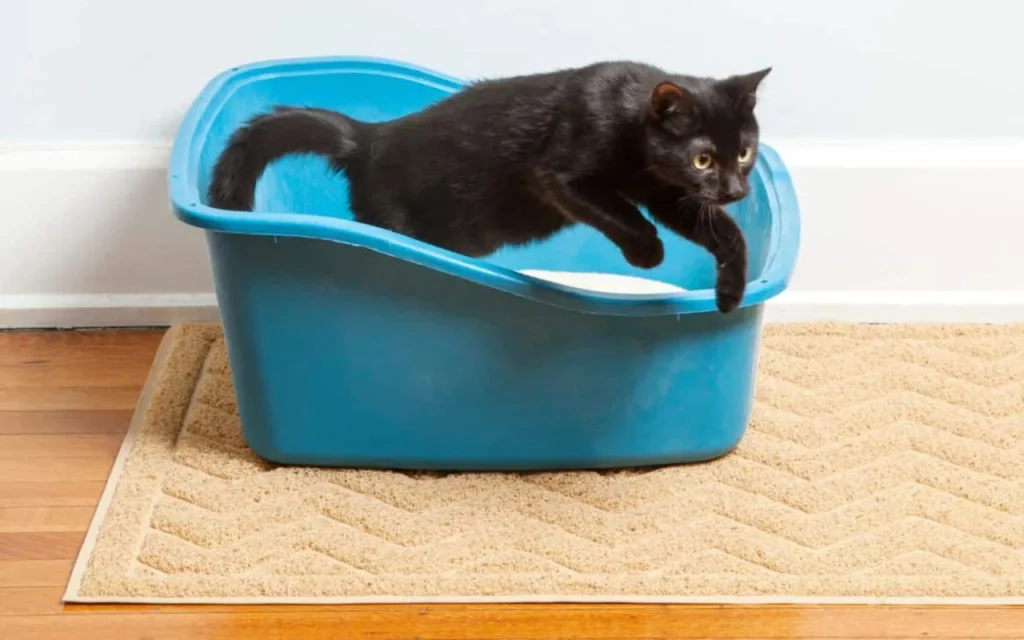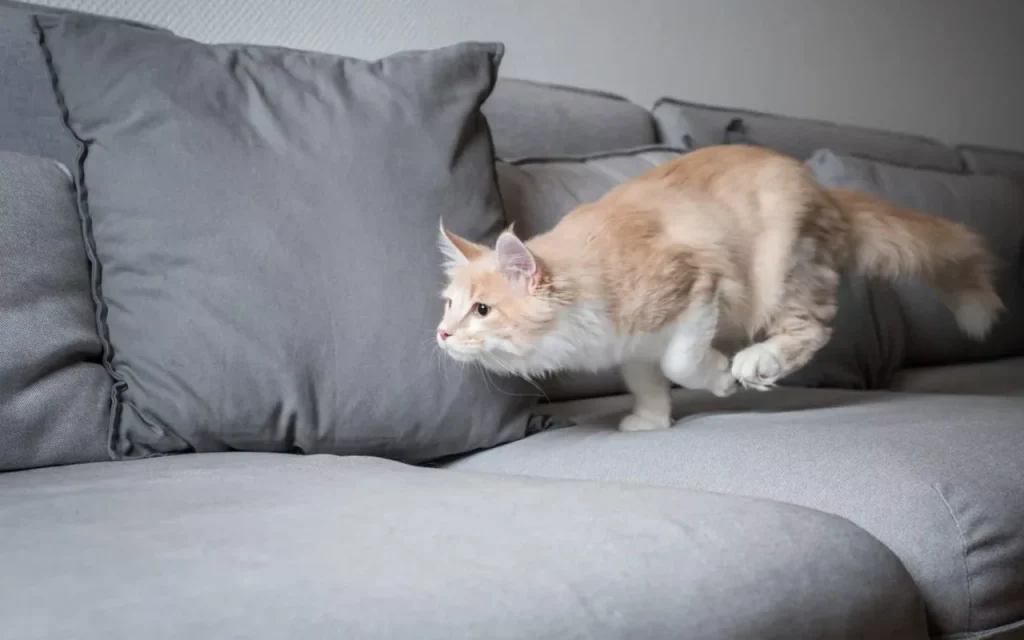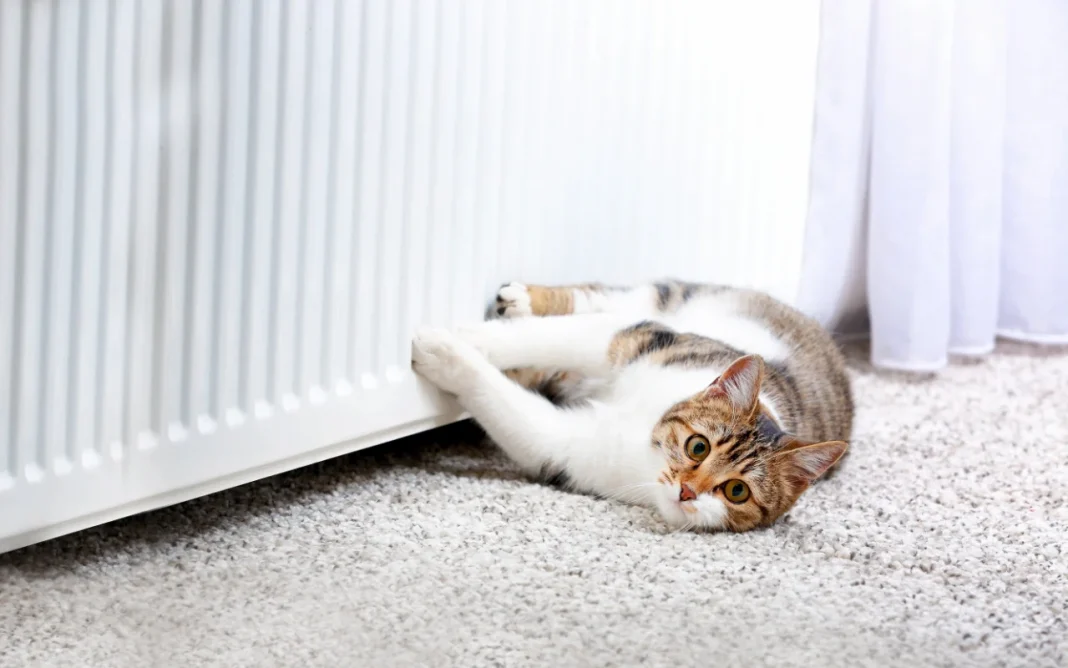You’ve seen it, haven’t you? That moment when your usually chilled-out kitty suddenly transforms into a furry little rocket. One second they’re a fluffy loaf on the armchair, the next they’re ricocheting off the walls, a blur of motion, eyes wide like saucers, maybe even attempting a death-defying leap from the bookshelf to the sofa. And then, just as quickly as it all began, poof! They stop, have a meticulous groom of one paw as if nothing whatsoever just happened, and then curl up for a nap. If that sounds like your house on any given day, then yup, you’ve witnessed the glorious chaos of the cat zoomies!
It’s honestly one of those cat behaviors that just makes you chuckle, doesn’t it? Pure, unadulterated feline energy. As a vet, I can tell you that most of the time, these sudden, wild bursts – what we sometimes call Frenetic Random Activity Periods, or FRAPs if you want to get technical (but who wants to get technical about zoomies?) – are just a totally normal, often pretty healthy, part of what makes a cat, well, a cat. But, you know, like with lots of things our quirky furballs do, there can be odd times when those frantic dashes might just be a little whisper that something else is going on under the surface.
So, let’s have a real heart-to-heart about why our cats get these hilarious zoomies, what’s just them being their wonderful, energetic selves, and when those mad dashes might actually be a little nudge to maybe have a chat with your vet.
The Hilarious Hurricane: What’s Normal Zoomie Behavior?

Before we get into the nitty-gritty, what do these zoomies usually look like when they’re just plain old fun? It’s that sudden, almost out-of-nowhere explosion of energy, isn’t it? Full-pelt running, often in circles or back and forth like they’re training for the Cat Olympics. You might see some seriously impressive leaps, sharp turns that would make a sports car jealous, and maybe a few comical skids if you’ve got wooden floors. Their eyes often go all wide and a bit “crazy,” and sometimes their tail might puff up a bit with all the excitement. But then, usually, after just a few minutes of this whirlwind, they suddenly stop, almost like a switch has been flicked off. That’s your classic, happy-go-lucky zoomie.
And why do they do it? Oh, for all sorts of perfectly normal cat reasons! Sometimes, especially if you’ve got a younger cat or a kitten, it’s just about burning off a heap of stored-up energy. Think about it – they’re little athletes, designed for short, sharp bursts of hunting. If they’ve been napping all day, that energy has to go somewhere! A good zoomie session is like us having a good run around to shake off the cobwebs.
Then there’s the famous “post-poop zoomie!” Oh yes, it’s a real phenomenon, and if you’ve had cats for a while, you’ve probably seen this victory lap. Why do they do it? Well, as a vet, I’ve heard a few theories, and they’re all rather amusing. One idea is that it’s a throwback to their wild ancestors – you know, do your business and then get away from the scene quickly so no predators can find you! Another thought, and this one makes me chuckle, is that the act of, well, pooping, can sometimes stimulate a nerve – the vagus nerve – that might give them a little rush, a sort of “poo-phoria,” if you will! Whatever the real reason, it’s usually just a harmless, if hilarious, quirk.
And of course, a lot of zoomies are just about that incredible inner hunter every cat possesses. Even if their biggest prey is a rogue dust bunny under the sofa, that instinct to stalk, chase, and pounce is powerful. A sudden zoom might just be them acting out a thrilling hunt in their imagination. It’s good for them to let that out! Sometimes it’s just pure, unadulterated joy and playfulness. Maybe you just got home, or they heard the treat bag rustle. That burst of speed can be them just bubbling over with happiness.
When a Mad Dash Might Be a Little Whisper for Help

Now, most of the time, as we’ve said, zoomies are just your cat being a wonderful, energetic goofball. But as a vet, I’ve also seen times when a change in that zoomie behavior, or zoomies happening in a certain way, has made me think, “Hmm, let’s look a little closer here.”
I remember one lovely, usually very sedate, older ginger cat named Marmalade. He was a distinguished gentleman of about 14. His owner brought him in, saying, “Doctor, it’s the funniest thing, Marmalade’s started acting like a kitten again! He’s tearing around the house like a lunatic!” And while it was amusing at first, she also mentioned he seemed a bit thinner, even though he was eating like he hadn’t seen food in a week. Well, we ran some tests, and it turned out dear old Marmalade had an overactive thyroid – hyperthyroidism. That condition can really rev a cat up, make them restless, and often very hungry but still lose weight. Once we got his thyroid sorted with medication, he went back to being his usual dignified, if slightly less zoomy, self. So, if your older, usually calm cat suddenly starts having these really intense, out-of-the-blue zoomies, especially if it comes with other changes like weight loss despite a good appetite, or drinking and peeing more, that’s definitely a cue for a vet visit, just to rule out things like an overactive thyroid.
Then there are times when the zoomies just don’t feel right. It’s less about joyful play and more… agitated? I recall another case, a sweet little tabby called Pip, who was adopted from a busy shelter. He’d have these frantic zoomie episodes, but he’d also be hiding a lot, and his owner noticed he’d yowl sometimes during his dashes. He wasn’t really playing; it felt more like he was trying to escape something, even in his safe new home. We chatted a lot about Pip’s background and his current environment. It turned out there was a new dog in the house next door that would bark a lot near the window where Pip liked to sit, and it was really stressing him out. The zoomies were more like little panic attacks. So, if your cat’s zoomies seem to be happening all the time, if they look distressed or panicked rather than playful, or if they just can’t seem to settle down, it might be a sign of underlying anxiety or stress. Sometimes, it can even be a sign of chronic boredom if their world isn’t quite stimulating enough for their active minds.
And of course, if those zoomies are happening alongside other things that just don’t add up – maybe they’re off their food, or suddenly drinking tons of water, they’re vomiting, have diarrhea, or seem painful when they move – well, those zoomies might just be one symptom in a bigger picture of them not feeling well. Pain, discomfort, even some odd neurological things can sometimes show up as unusual activity levels.
One other thing we sometimes see, especially in our very senior kitties, is if they start zooming mostly at night, and it’s really disruptive. While cats are naturally a bit more active at dawn and dusk (that’s their crepuscular nature!), if it’s a new thing for your old timer to be tearing around at 3 a.m. every night, and maybe they seem a bit confused or are yowling more too, it can sometimes be a little hint of cognitive dysfunction – a bit like kitty dementia.
Keeping Your Furry Rocket Happy & Safe (and Knowing When to Call Us!)
For those everyday, happy-go-lucky cat zoomies, the best thing you can do is just make sure your house is a safe playground (maybe move that precious vase when they get the zoomy look in their eye!) and give them lots of good ways to burn off that fabulous energy:
- Playtime, playtime, playtime! Get out those feather wands, laser pointers (but always let them “catch” a real toy at the end so they don’t get frustrated – that’s a top tip!), crinkly balls, toy mice… aim for a couple of good, energetic sessions every day.
- Make their world interesting! Think puzzle feeders that make them work for their treats, cat trees they can climb like intrepid explorers, scratching posts to save your sofa, and comfy window perches where they can watch the world (and the birds!) go by. A cat whose mind is busy is often a happier cat.
- And sometimes? Just sit back and enjoy the hilarious show!
But when should you pick up the phone and book that vet appointment specifically about the zoomies?
Well, if your older cat suddenly develops a zoomie habit out of the blue, especially if they’ve always been pretty chilled. Or if the zoomies seem really over-the-top, or if your cat looks genuinely distressed or panicked during them, not playful. Definitely if those zoomies are happening alongside any other signs that they’re not feeling well – like changes in their appetite or thirst, weight loss, tummy upsets, or if they seem sore. And if those nighttime zoomies are turning your life upside down, it’s worth a chat.
Basically, if you’re just worried, or if something about their zoomie behavior feels “off” or has changed significantly, trust that little gut feeling. Your vet can help figure out if it’s just your cat being their wonderfully quirky self, or if there’s something underlying that needs a bit of attention. We can rule out medical issues like hyperthyroidism, talk about any potential stress or anxiety triggers in their life, and give you tailored advice to make sure your cat is happy, healthy, and their zoomies are just a joyful, normal expression of their amazing cat-ness!











